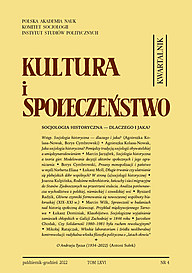GŁÓWNE CZYNNIKI FORMOWANIA SIĘ NOWOCZESNEJ WSPÓLNOTY BIAŁORUSKIEJ (XIX–XXI W.)
THE MAIN FACTORS IN THE FORMATION OF THE MODERN BELARUSSIAN COMMUNITY (19th TO 21st CENTURIES)
Author(s): Ryszard RadzikSubject(s): Social history, Recent History (1900 till today), Present Times (2010 - today)
Published by: Instytut Studiów Politycznych PAN
Keywords: Belarussian society; societal change; 2020 protests in Belarus; identity; community; Sovietism;
Summary/Abstract: The purpose of the deliberations in the article — within the framework of historical sociology — is to reconstruct societal processes between the final decades of the partitions and the modern day forming Belarussian society in terms of community and identity. The matter of interest here is pointing out selected elements of the mechanism behind the evolution of Belarussian society, which in time came to be suspended between the symbolically conceived East and West. To what degree are the problems of today’s Belarussian society rooted in the 19th century and Soviet times? There are undoubtedly three types of community in Poland’s eastern neighbour: the triune Ruthenian nation, the Soviet community, and the national community. The transition in the 19th century from the western to the Russian cultural sphere triggered the adoption of Russian mechanisms of social development, and weakness in the rootedness of the constructs (values) of multi- -generational continuity, including in state institutions, a consequence of which is the distance among a significant portion of Belarussians towards the realities of societal life, which they perceive as external to them. The loss of society’s elites as a result of the Bolshevik revolution and repression of the 1930s resulted in Belarussians becoming an almost exclusively peasant society. Sovietism was imposed on them — unlike, for example, in the Baltic republics — before the formation of national communities.
Journal: Kultura i Społeczeństwo
- Issue Year: 66/2022
- Issue No: 4
- Page Range: 113-158
- Page Count: 46
- Language: Polish

